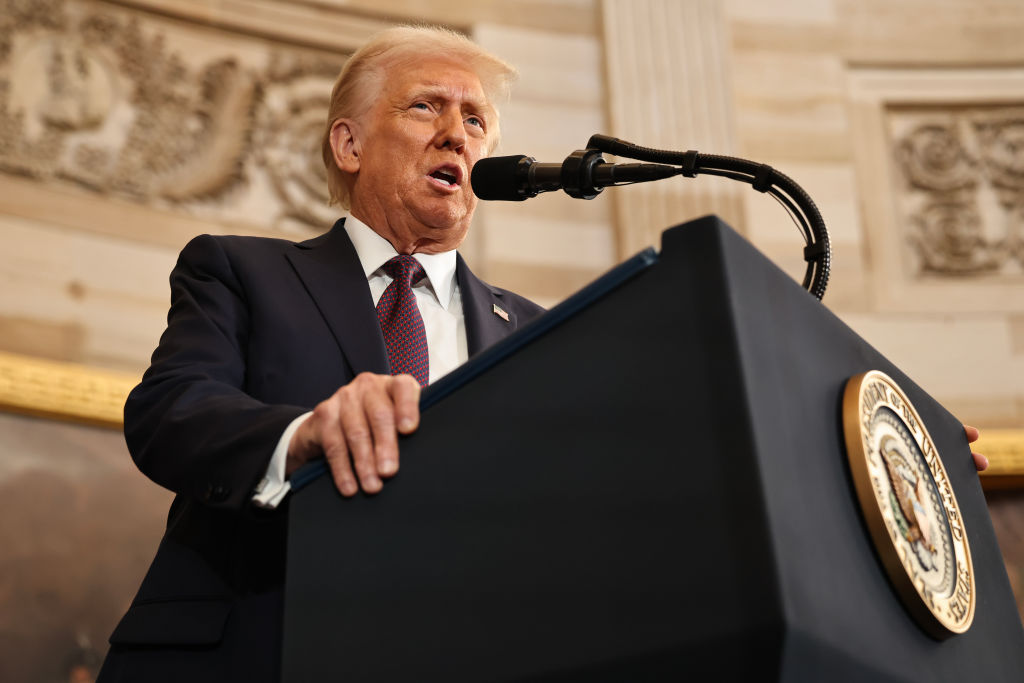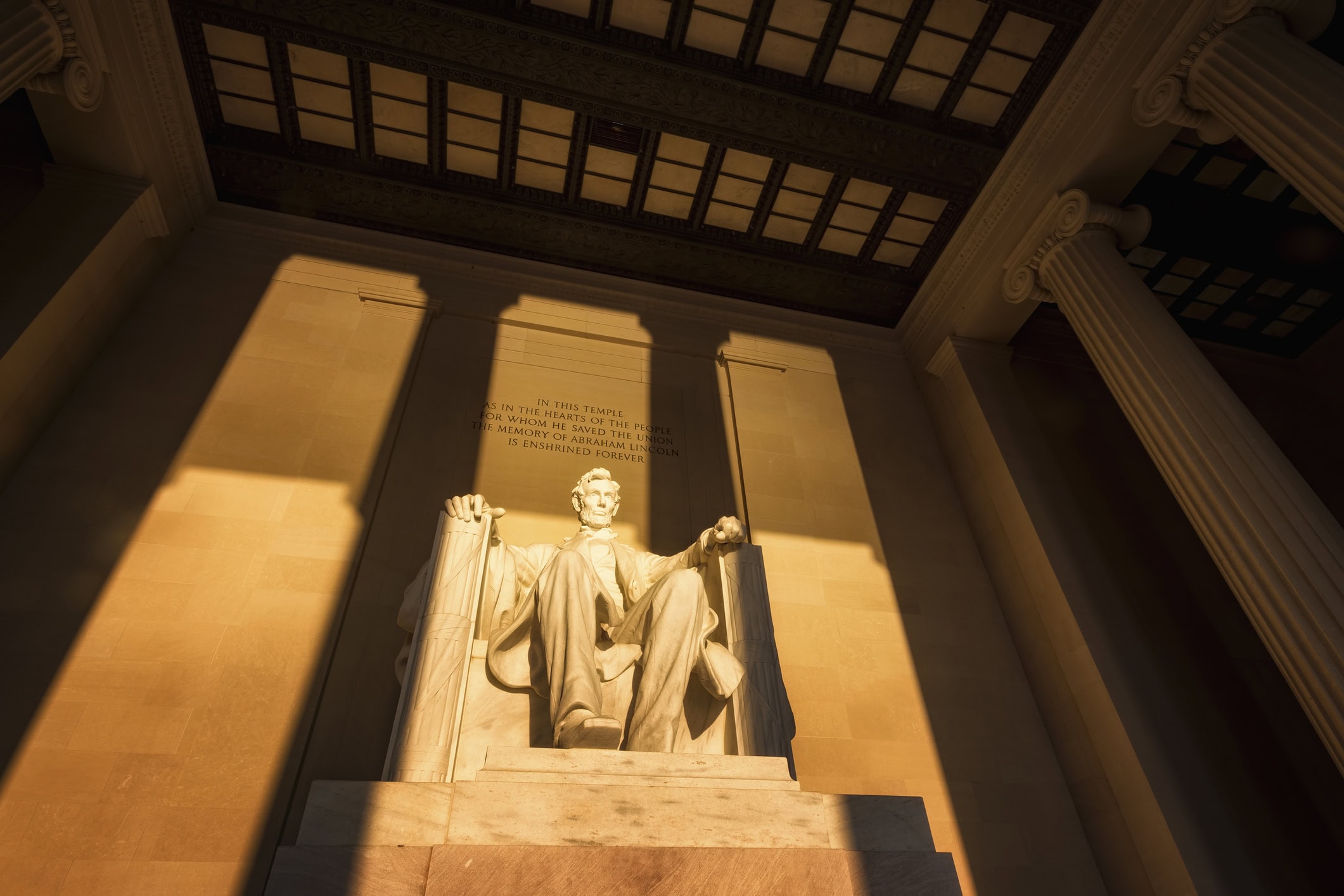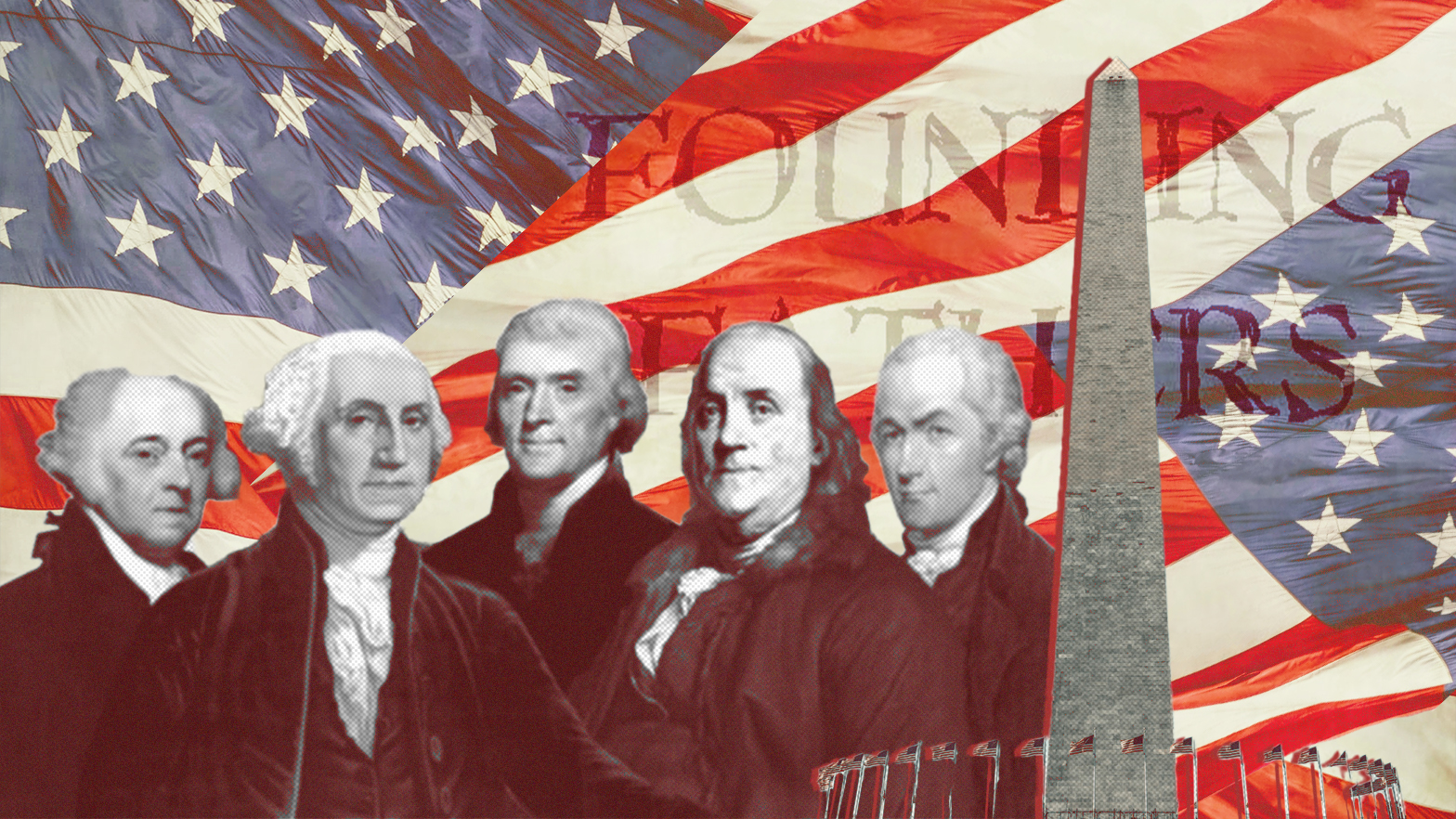Conservatives need to be a lot savvier about how they vet judicial candidates.
Trump’s Reach for Greatness

He attacked ideological fanaticism and highlighted the spirit of a free people.
At the beginning of each presidential term, an inaugural address provides an opportunity for a president to set the tone for things to come through an artful articulation of principle, a considered reflection on the present and the future, and, at least on some occasions, an inspired political poetry that appeals to “the better angels of our nature.” Donald J. Trump’s Second Inaugural Address did much of this, but with the soaring poetry (which was ample enough) appearing only in the final section of the speech.
More than a few commentators have noted, not without justification, that Trump’s address on the 20th of January 2025 at times resembled a State of the Union Address more than a classic inaugural one. But there is a perfectly justified reason for this: President Trump and his supporters believe, rightly in my view, that the Left’s zealous commitment to DEI and the new racialism, transgender ideology, “saving democracy” by burying it, “lawfare” directed against political opponents (most notably Trump himself), and the censoring of free political speech in the name of fighting “misinformation” threatens the very fabric of our constitutional republic, along with its indispensable moral and cultural prerequisites. In these circumstances, it was not possible or appropriate to declare as a victorious Thomas Jefferson had done in 1801, “We are all Republicans, we are all Federalists.”
Despite the acrimony that dominated American politics in the 1790s (heated disputes occurred over executive power, the French Revolution, and much more), the differences between the two sides did not touch on the fundamentals of civilization itself. It is one thing to irresponsibly encourage partisan acrimony, to throw gasoline on the fire of civic disputation. But it is another thing altogether for a politics and culture of negation and repudiation to take aim at the very pediments of constitutional government and the moral foundations of a self-governing people. Trump thus needed to proceed in a way that would inevitably make his predecessors squirm.
But before one feels too sorry for the likes of presidents Obama and Biden, it must be remembered that they had indeed promoted wokeness at every level of government and society, including the military. They had racialized American life in a way that exacerbated racial discord, and they had engaged, as Trump said, in “the vicious, violent, and unfair weaponization of the Justice Department.” They had encouraged a malign gender cult that led to deep confusion among young people, which was often accompanied by physical mutilation and psychological manipulation. They had shown deep hostility to the traditional American view that liberty is always “under God” and had promoted national self-loathing (not to be confused with necessary and salutary self-criticism) that gave the young little reason to esteem their country or display gratitude toward our forebears. They had governed incompetently, as Trump noted, being too concerned with various inane efforts at social engineering, such as increasing the number of lesbians in the Los Angeles Fire Department, rather than carrying out the core responsibilities of a limited but effective government at the local, state, and federal levels.
In a word, they were inebriated with ideology and a “progressivist” worldview that has become nothing less than a totalizing secular religion. They had succumbed to the reductio ad Hitlerum, unable to distinguish between American conservatives and populists and the murderous totalitarianism of Adolf Hitler, a failure of political cognition that is at once pathetic and alarming. Even on Inauguration Day, Left/liberal talking heads, and not a few Democrats in Congress, convinced themselves that Elon Musk was making Nazi salutes to enthusiastic MAGA supporters and that Melania Trump’s gorgeous dress for the evening’s inaugural balls somehow contained coded swastikas.
Trump, in contrast, did not engage in any comparable displays of paranoid ideological fantasizing. Instead, he emphatically rejected that vision of America, even having the temerity to call it un-American and at odds with a “common sense” approach that is a hallmark of America’s tradition of a free and decent political life. Trump was tough-minded but truthful. He powerfully defended and articulated classic American principles and virtues that have been under assault for a long time from those who had succumbed to what the late Roger Scruton suggestively called “the culture of repudiation.”
In his address, Trump boldly repudiated repudiation. He unapologetically reaffirmed American “sovereignty” and the sacrosanct character of our borders, without which there can be no self-governing nation or even a “people.” He firmly rejected any effort to “socially engineer race and gender into public and private life.” Trump pledged that “it will henceforth be the official policy of the United States government that there are only two genders: male and female.” That liberating pledge, and the executive orders that followed from it later that day, are most welcome, indeed.
But it was a mistake to reject gender ideology while using the faux categories of gender ideology itself. Until 1975 or so, “gender” was simply a grammatical category. “Socially constructed” genders have nothing to do with the primordial truth that God (and nature) created both male and female in his own image, in the language of the Book of Genesis. We can only overcome the ubiquity of gender categories in the culture (and in our politics) if we stop using it as a synonym for “sex.” It is not and never will be. It is a fictive category.
With that said, Trump’s speech was impressively theocentric (not theocratic). It did not accept the progressivist identification of freedom with radical secularism. The “exceptional” America he unapologetically defended is, as he put it, that of “one glorious nation under God.” Our nation is called to great things and must be “full of compassion, courage, and exceptionalism.”
One profound way America is exceptional is that our proud affirmation of our liberty, independence, and sovereignty does not make an idol of itself, because it does not usurp the sovereignty of an all-powerful, just, and merciful Creator. Our ambition as a free, vigorous, and energetic people is best understood as the noble use of gifts and talents given to us by the Most High. That has nothing to do with the way a barbarous modern pagan nationalism (which made a perverse idol of itself) such as Hitler’s, which made fodder of the German people, unleashed devastating wars and engaged in monstrous genocidal projects against the Jews, Poles, gypsies, and others. The beginning of wisdom is to honor the distinctions inherent in political reality itself. Critics egregiously fail to do so when they confuse Trump with Hitler and Stalin, as the likes of once sane political commentators such as Bill Kristol and Anne Applebaum now habitually do.
Donald Trump also made a moving reference to the “assassin’s bullet” that “ripped through [his] ear” in a “beautiful Pennsylvania field” in the summer of 2024. That experience, combined with the sustained and systematic efforts of Left/liberal elites to throw him in jail on the most spurious charges, has no doubt made Trump more thoughtful and introspective, more disciplined and discreet. But there is something jarring about his declaration that “I was saved by God to make America Great again.” A more seasoned and classical statesman might have referred more modestly to the hand of Providence at work in those events, and made the same point less dramatically and self-referentially.
Trump is a man of undeniable courage (“fight, fight, fight!”). The unscrupulous efforts of his opponents to bring him down at any cost, beginning with the great lie that was “the Russian Hoax,” undoubtedly have been a source of constant stress, strain, trial, and challenge. But Trump, who is not a great student of history, may overstate his case when he said unequivocally that “I have been tested and challenged more than any president in our 250-year history.” The Civil War presidency of Abraham Lincoln, with Confederate armies a dozen miles from the capital, and with rebellious armies (and Copperhead propagandists) challenging the survival of the Union itself, surely is the top contender for the position of most “tested and challenged” American president. Trump will be Trump. But a modification of his hyperbole might serve to help transform a courageous American president into something more closely resembling a statesman.
In a thoughtful reflection on Trump’s speech, Wall Street Journal columnist Gerard Baker astutely remarked that the woke oligarchy that Trump is driving from office (if not all our institutions, where they remain deeply instantiated) is and remains committed “to a creed based on an unholy ideological trinity: borderless globalism, environmental eschatology and puritan wokery.” In his speech, Trump took aim at this malignant trinity, as well as racist “anti-racism,” and did so clearly, cogently, and forcefully.
There was a missed opportunity or two. He enthusiastically affirmed Martin Luther King, Jr.’s “Dream” on MLK Day without explicitly saying what it was, namely, judging human beings by “the content of their character” and not “the color of their skin.” His admirable refusal to accept the delusions of climate fanaticism and the resultant de-industrialization of Western economies that would follow from net-zero policies should have been accompanied by a brief, instructive account of why “environmental eschatology” is wrong, and is a secular religion far more than an established science. He could have made those points more directly and explicitly. That would serve to educate a public badly misled by the propaganda of radical environmentalists, propaganda, alas, that has largely become the new “consensus.”
It is good to see a president proclaim quite emphatically that the maintenance of “peace” and the eschewal of unnecessary foreign entanglements and interventions will be the central tenet of American foreign policy going forward. Trump wants a strong America, not an “isolated” one, and a country respected, feared, and, when possible, admired—but not one dedicated to global social engineering or other utopian and self-destructive projects. He wants America and Americans to “dream” big things, “impossible” things, but he meant that inspirationally, not literally.
Trump’s desire to recover the Monroe Doctrine and a renewed sense of “Manifest Destiny” is in some tension with his wish for a more peaceful America, and a more peaceful world. Other nations, and not ones that are invariably hostile to the United States, may be inclined to see in the expansion of American territory to include Greenland or the Panama Canal as destabilizing imperialism. That inevitable tension in a Trumpian foreign policy must be managed with a certain prudence, even delicacy, and not just with bluster or high-sounding words. One must resist our enemies, ideological or otherwise, while still paying a “decent respect to the opinions of mankind,” in the words of our Declaration of Independence.
But let me end not with criticisms, however friendly or supportive. In the final, poetic part of the address, Trump flies high in noble and inspiring ways. He reminds us of all the good things Americans have done and can do: crossing a continent, scaling mountains, ending slavery, defeating vile tyrannies, splitting the atom, rescuing tens of millions from poverty. Americans of diverse backgrounds and walks of life “laid down the railroads, raised up the skyscrapers, built great highways, won two world wars, defeated fascism and communism, and triumphed over every single challenge that they faced.”
This is inspirational and aspirational political poetry that just happens to be true. Trump rightly wants to dream big, reinvigorate just admiration for the achievements of our forebears, and repudiate the nihilistic abdication of truth and responsibility that is the culture of repudiation. About all that, I have no quarrel whatsoever. “We will not be conquered, we will not be intimidated, we will not be broken, and we will not fail,” Trump confidently stated near the end of his speech. That is the spirited creed of a free, self-respecting people. Informed by wise, prudent statecraft, that commitment can do wonders.
The American Mind presents a range of perspectives. Views are writers’ own and do not necessarily represent those of The Claremont Institute.
The American Mind is a publication of the Claremont Institute, a non-profit 501(c)(3) organization, dedicated to restoring the principles of the American Founding to their rightful, preeminent authority in our national life. Interested in supporting our work? Gifts to the Claremont Institute are tax-deductible.
Lincoln’s natural rights statesmanship should be our guide.
A response to Angelo Codevilla.
Trump needs to leverage his close relationship with local law enforcement.
A reply to Matthew Continetti's recent critique.
And how to flip it back.






